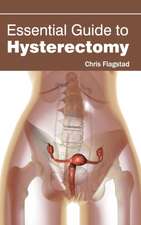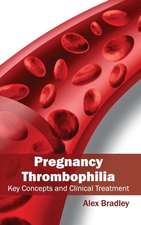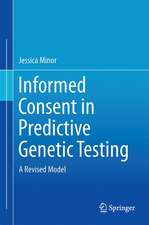Epidemiology of Human Congenital Malformations
Autor Bengt Källénen Limba Engleză Paperback – 23 aug 2016
The subject of this book is to describe the occurrence of congenital malformations among children born and what risk factors exist. Population data are presented for a number of malformations, ascertained with the use of data from the Swedish national health registers for the period 1998-2010 corresponding to some 1.3 million births, together with prospectively collected information on a group of exposures of possible interest. The structure of the analysis is such that it excludes studies of, for instance, nutrition, alcohol or street drug use and many other lifestyle factors where prospective information or independent register information is difficult or impossible to obtain.
Epidemiology of Human Congenital Malformations culminates with a discussion on how the presence of malformations can be explained and various possibilities for the prevention of birth defects. Moreover, it will include a series of instructions on how to read epidemiological literature in this field making it an essential resource both for those currently working in the field of reproductive epidemiology or those intending to enter it. It will additionally be useful for doctors working with malformations, either as obstetricians, neonatologists or pediatricians.
| Toate formatele și edițiile | Preț | Express |
|---|---|---|
| Paperback (1) | 842.09 lei 6-8 săpt. | |
| Springer International Publishing – 23 aug 2016 | 842.09 lei 6-8 săpt. | |
| Hardback (1) | 730.71 lei 3-5 săpt. | |
| Springer International Publishing – 11 oct 2013 | 730.71 lei 3-5 săpt. |
Preț: 842.09 lei
Preț vechi: 886.41 lei
-5% Nou
Puncte Express: 1263
Preț estimativ în valută:
161.18€ • 175.14$ • 135.48£
161.18€ • 175.14$ • 135.48£
Carte tipărită la comandă
Livrare economică 21 aprilie-05 mai
Preluare comenzi: 021 569.72.76
Specificații
ISBN-13: 9783319348988
ISBN-10: 3319348981
Pagini: 180
Ilustrații: IX, 170 p. 32 illus. in color.
Dimensiuni: 210 x 279 x 9 mm
Greutate: 0.42 kg
Ediția:Softcover reprint of the original 1st ed. 2014
Editura: Springer International Publishing
Colecția Springer
Locul publicării:Cham, Switzerland
ISBN-10: 3319348981
Pagini: 180
Ilustrații: IX, 170 p. 32 illus. in color.
Dimensiuni: 210 x 279 x 9 mm
Greutate: 0.42 kg
Ediția:Softcover reprint of the original 1st ed. 2014
Editura: Springer International Publishing
Colecția Springer
Locul publicării:Cham, Switzerland
Cuprins
A Short History of Birth Defect Epidemiology.- Genetic and Non-genetic Factors in the Origin of Congenital Malformations.- Ascertainment of Children with Congenital Malformations.- Statistical Considerations.- Epidemiological Methods.- Neural Tube Defects.- Microcephaly.- Hydrocephaly.- Agenesis of Corpus Callosum and Holoprosencephaly.- Severe Eye Malformations.- Severe Ear Malformations.- Cardiovascular Defects.- Orofacial Clefts.- Atresia or Stenosis of the Alimentary Tract.- Pyloric Stenosis.- Malrotation of the Gut.- Megacolon.- Hypospadias.- Epispadias, Cloacal and Bladder Exstrophy.- Severe Renal Malformations.- Posterior Urethral Valve.- Pes Equinovarus.- Other Foot Deformities than Pes Equinovarus.- Polydactyly and Syndactyly.- Limb Reduction Defects.- Craniostenosis.- Diaphragmatic Hernia.- Abdominal Wall Defects.- Children with multiple malformations.- ”Syndromes”.- Down Syndrome.- Explanation and Prevention of Birth Defects.- Eight Commandments: Rules for the Interpretation of Birth Defect Epidemiological Studies.
Recenzii
From the book reviews:
“A concise text based on a register performed by the Swedish National Board of Health and Welfare. In addition to the description of a long list of birth defects with bibliography, the last chapter contains a discussion on the explanation and prevention of these defects. For obstetricians, geneticists and neonatologists.” (Pediatric Endocrinology Reviews (PER), Vol. 12 (1), September, 2014)
“Dr. Bengt Kallen relates his 50-plus years of experience in reproductive epidemiology in this collection that describes the epidemiology of human congenital malformations. … This is a well-organized compilation of decades worth of research, and is a very useful resource for clinicians or researchers in the field of birth defects epidemiology.” (Kelli K. Ryckman, Doody’s Book Reviews, February, 2014)
“A concise text based on a register performed by the Swedish National Board of Health and Welfare. In addition to the description of a long list of birth defects with bibliography, the last chapter contains a discussion on the explanation and prevention of these defects. For obstetricians, geneticists and neonatologists.” (Pediatric Endocrinology Reviews (PER), Vol. 12 (1), September, 2014)
“Dr. Bengt Kallen relates his 50-plus years of experience in reproductive epidemiology in this collection that describes the epidemiology of human congenital malformations. … This is a well-organized compilation of decades worth of research, and is a very useful resource for clinicians or researchers in the field of birth defects epidemiology.” (Kelli K. Ryckman, Doody’s Book Reviews, February, 2014)
Notă biografică
Bengt Källén is professor emeritus of embryology at Lund University in Sweden. He has been working in birth defect epidemiology since the 1960s and was one of the founders of the Swedish Register of Congenital Malformations, one of the first registers started after the thalidomide tragedy around 1960. He worked for many years in the International Clearinghouse for Birth Defects Monitoring Systems and has published numerous scientific articles on congenital malformations, most notably on the effect of maternal drug use and in vitro fertilization.
Textul de pe ultima copertă
The subject of this book is to describe the occurrence of congenital malformations among children born and what risk factors exist. Population data are presented for a number of malformations, ascertained with the use of data from the Swedish national health registers for the period 1998-2010 corresponding to some 1.3 million births, together with prospectively collected information on a group of exposures of possible interest. The structure of the analysis is such that it excludes studies of, for instance, nutrition, alcohol or street drug use and many other lifestyle factors where prospective information or independent register information is difficult or impossible to obtain.
Epidemiology of Human Congenital Malformations culminates with a discussion on how the presence of malformations can be explained and various possibilities for the prevention of birth defects. Moreover, it will include a series of instructions on how to read epidemiological literature in this field making it an essential resource both for those currently working in the field of reproductive epidemiology or those intending to enter it. It will additionally be useful for doctors working with malformations, either as obstetricians, neonatologists or pediatricians.
Epidemiology of Human Congenital Malformations culminates with a discussion on how the presence of malformations can be explained and various possibilities for the prevention of birth defects. Moreover, it will include a series of instructions on how to read epidemiological literature in this field making it an essential resource both for those currently working in the field of reproductive epidemiology or those intending to enter it. It will additionally be useful for doctors working with malformations, either as obstetricians, neonatologists or pediatricians.
Caracteristici
Only book available exclusively covering the epidemiology of human congenital malformations and possible risk factors Based on the analysis of data from the Swedish National Health registers for the period 1998-2010, corresponding to some 1.3 million births Authored by Professor Emeritus Bengt Källén, ?an internationally recognised expert in the field of birth defect epidemiology ? Includes supplementary material: sn.pub/extras




























